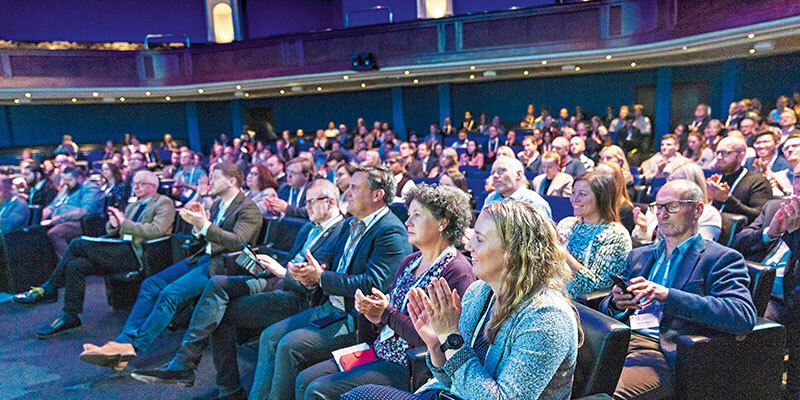Adam Burke reviews proceedings from GeoCom 22, this year’s flagship event staged in London by the Association for Geographic Information

The first in-person AGI annual conference in three years attracted more than 260 registered delegates with a world-class line up of speakers and a theme of sustainability described as a ‘Netflix binge for geo-nerds’, to the Royal Geographical Society headquarters in London.
I had the pleasure of welcoming the packed audience to the event in early October and introducing the first speaker Tom Harris, Partner and ESG Digital, Data and Analytics Leader at Deloitte who explored how geospatial data can help how organisations impact sustainability. He exposed the juxtaposition of ‘dirty’ mining versus the requirement for ‘clean’ metals before championing the role of maps to tell emotive stories and drive change.
Mark Tabor, Principal Consultant at Ordnance Survey, showcased the agency’s 230-year history of innovation and how new solutions, such as OS VeriEarth - a spatial service for restoration and carbon offsets - are being developed. Steve Ramage, Chief Engagement Officer for the Group on Earth Observations stunned us with the revelation the $80 million Green Climate Fund has no mandate for earth observation before showcasing the role of geo in life-saving projects and concluding that ‘when geo does something it does it with intent’.
After coffee, and the first chance to network with event sponsors Esri UK, Ordnance Survey, Geospatial Commission, Carto, Cadcorp, Geoplace, Verisk and Cadline, the morning continued with Claire Pini and James Hemingway from the Department for Business, Energy and Industrial Strategy (BEIS) introducing the National Energy Efficiency Data framework (NEED). This property-level dataset is designed to provide insights into energy use and has the potential to identify buildings suitable for energy efficiency measures.
Henry Odbert, Senior Scientist at the Met Office, made the audience think about how all modes of transport are affected by weather and how new types of transport, such as Autonomous Vehicles, simply have different vulnerabilities before exploring how spatial and temporal data can be used to inform strategic decision making for safe, efficient and sustainable transport.
After lunch, again with more opportunities for networking and much needed sustenance, the afternoon kicked-off with a panel style session chaired by Wayne Newton of Geovation, the start-up accelerator programme, with guests Christopher Jackson of Advanced Infrastructure and Chris Hildray of Proxy Address. With a common theme of vulnerabilities, Christopher showcased a digital twin of the UK energy system and how it is informing EV infrastructure planning, while Chris revealed how donated or loaned ‘addresses’ are giving homeless people a hand- up, not a hand-out.
The second panel was chaired by Emma Chown of the AGI’s Early Careers Network (ECN). Joined by Jody Shaw of Arcadis and Esther Ogbu of Esri UK, Emma presented the initial findings from the AGI / RGS survey which looked at the influences, beyond pay, on career decisions.
Back to more formal proceedings and Owen Lauder of Esri UK, explored how businesses can use the lens of geography to create sustainable supply chains. Geology was the topic addressed by Christopher Jackson, Director of Sustainable Geoscience at Jacobs, who posed the question, can geology save the world? The answer was, of course, yes! Christopher championed the role of geo in meeting societal challenges and struck a chord with the audience by declaring ‘everyone needs a geoscientist for a friend’.
Past AGI Chair and Community and Ethics Partner at PLACE, Denise McKenzie, closed the proceedings by thanking the team that made the day a success and urged the audience to get more involved with the AGI, not least by meeting at a nearby pub where, I understand, discussions went on well into the evening!
Adam Burke is Chair of the Association for Geographic Information, an independent and impartial membership organisation that represents the UK geospatial sector (www.agi.org.uk)


